Retired head teacher Mahmoud welcomed us into his neat garden in the Jordan Valley in the occupied West Bank. He held aside a branch of a low growing palm tree to reveal clusters of darkening dates hanging inside black netting bags.
‘Luckily dates grow without needing much water’
Mahmoud, retired teacher
Ever the teacher, he explained that local Palestinians used to cultivate citrus fruits and bananas and other crops as well as date palms. But today, due to severe water shortages, farmers mainly grow date palms, the only crop that survives with very little water.
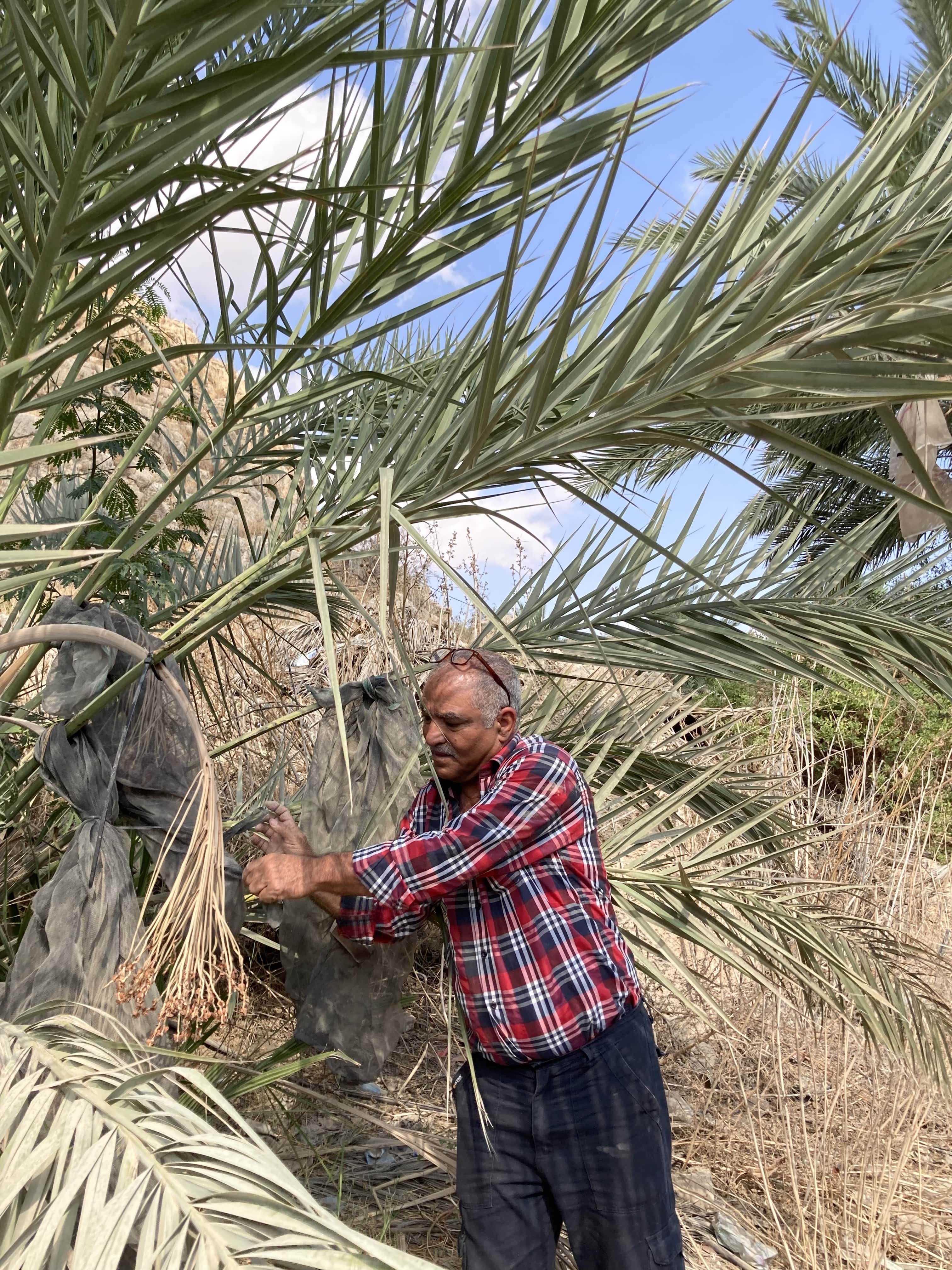
Mahmoud with his date palm tree, Jordan Valley
These shortages are no accident. They are the result of what Palestinian human rights organisation Al-Haq calls “water apartheid” — a deliberate system of Israeli policies which restrict Palestinians’ access to their own water resources while privileging access for Jewish-Israeli citizens.
Mahmoud is one of the 60,000 Palestinians living in the Jordan Valley, also known as the breadbasket of Palestine. The valley is one of the most fertile areas of occupied Palestine with abundant, natural water resources. Yet since Israel’s illegal military occupation began in 1967, Israel has systematically appropriated and exploited Palestinian land and natural resources to expand Jewish-only settlements illegal under international law, while preventing Palestinians from building their own infrastructure. The result: only 36% of Palestinians in the West Bank have running water every day compared to almost 100% of Israeli citizens in Israel and the settlements, as reported by the Israeli human rights organisation B’Tselem. Many are forced to buy water from Israeli state company Mekorot, which takes over local supplies and sells them back at inflated prices.
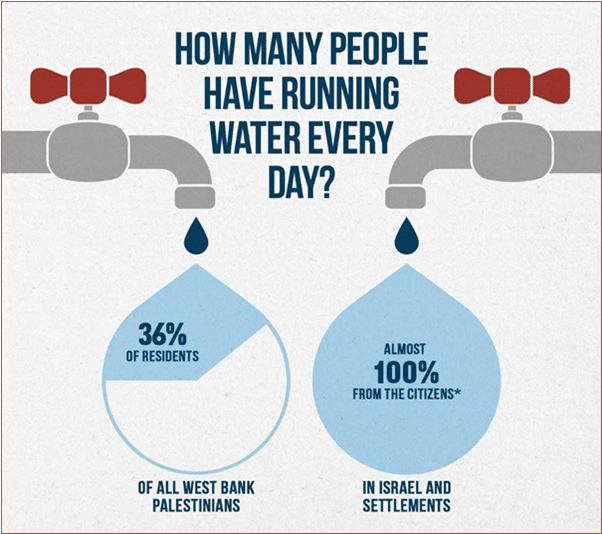
Additional information: More than 100,000 Palestinian citizens of Israel, who live in communities the state refuses to recognise, are not hooked up to the water grid.
On a visit to the nearby farming town Bardala, we met council leader Ahmed. He told us how the Israeli government’s occupation practices have created their water crisis.
‘We never got the water [that they] promised’
Council leader, Ahmed
Ahmed recalled how in the 1970s, the Israeli army suggested to Bardala’s Palestinian-run council that the army could build a new modern well, controlled by Israel, deeper than the existing one. The council agreed and there were agreements for how much water would be supplied to Palestinians and to the nearby Israeli settlements.
‘But this never happened. The army built the new well and most of its water is taken away for their own farms and settlements. The water company replaced the pipes supplying Palestinians and made them narrower. We got less water than our old pump supplied.’
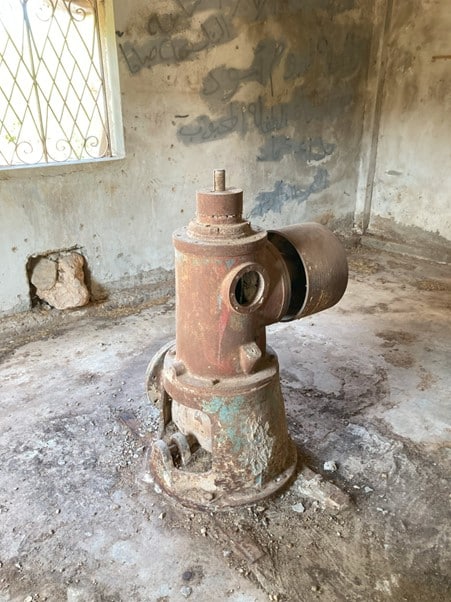
Disconnected water pump in Bardala
This syphoning of water resources to settlements is not confined to Bardala. In Furush Beit Jahan, another village in the Jordan Valley, Palestinian farmers have seen drastic drops in water supply after Israeli wells were dug to supply the nearby illegal settlement of Hamra, which farms 100 acres of date palms as well as water-intensive bananas and citrus.
Depriving Palestinians of water is illegal under international law. In July 2024, the International Court of Justice (ICJ) advisory opinion confirmed that the Israeli military occupation of Palestine, including its control over natural resources, is illegal.
Abu Ahmed told us how as a boy before the Israeli occupation began in 1967, he went shepherding in the hills of Al Farisiya and took cattle to springs for water.
‘It used to be paradise here.’
But now they have to buy water from the Israeli company Mekorot which delivers water by road using water tanker lorries. Abu Ahmed told us that Mekorot takes the water they used to use freely and sells it back to them. He also explained how even if a water tanker is available, Palestinians have difficulty both affording the water and getting to the delivery point due to settler harassment.
We met one elderly lady called Hamda. She lived alone in a tent next to the scorpion and snake infested rubble of her home which the Israeli army had recently demolished. A Mekorot water tanker came to the main road every week and she would buy expensive water from there and carry it to her house. Hamda said that Israelis from the close by settlement would shout and swear at her. This made her frightened to go and collect her water. She said:
‘Settlers are so violent I’m scared to collect water when the tanker comes.’
Hamda, elderly resident of the Jordan Valley
Settler violence and water shortages also affect livestock. Palestinians in the Jordan Valley have taken cattle to the springs and river at Al Auja for centuries. But this year settlers had banned Palestinians from taking their herds to the natural waters. One day in the Jordan Valley hills a pregnant cow separated from the herd and went towards the spring. The owners said that their cow had learned where the waters are from her mother when she herself was a calf. Animals will always head to water and know the tracks. They said:
‘She was pregnant and thirsty. She did not know that she was a Palestinian cow. She did not know she was not allowed to go there any more.‘
The owners found her body by the spring water. Settlers had bludgeoned her head with rocks and she had died.
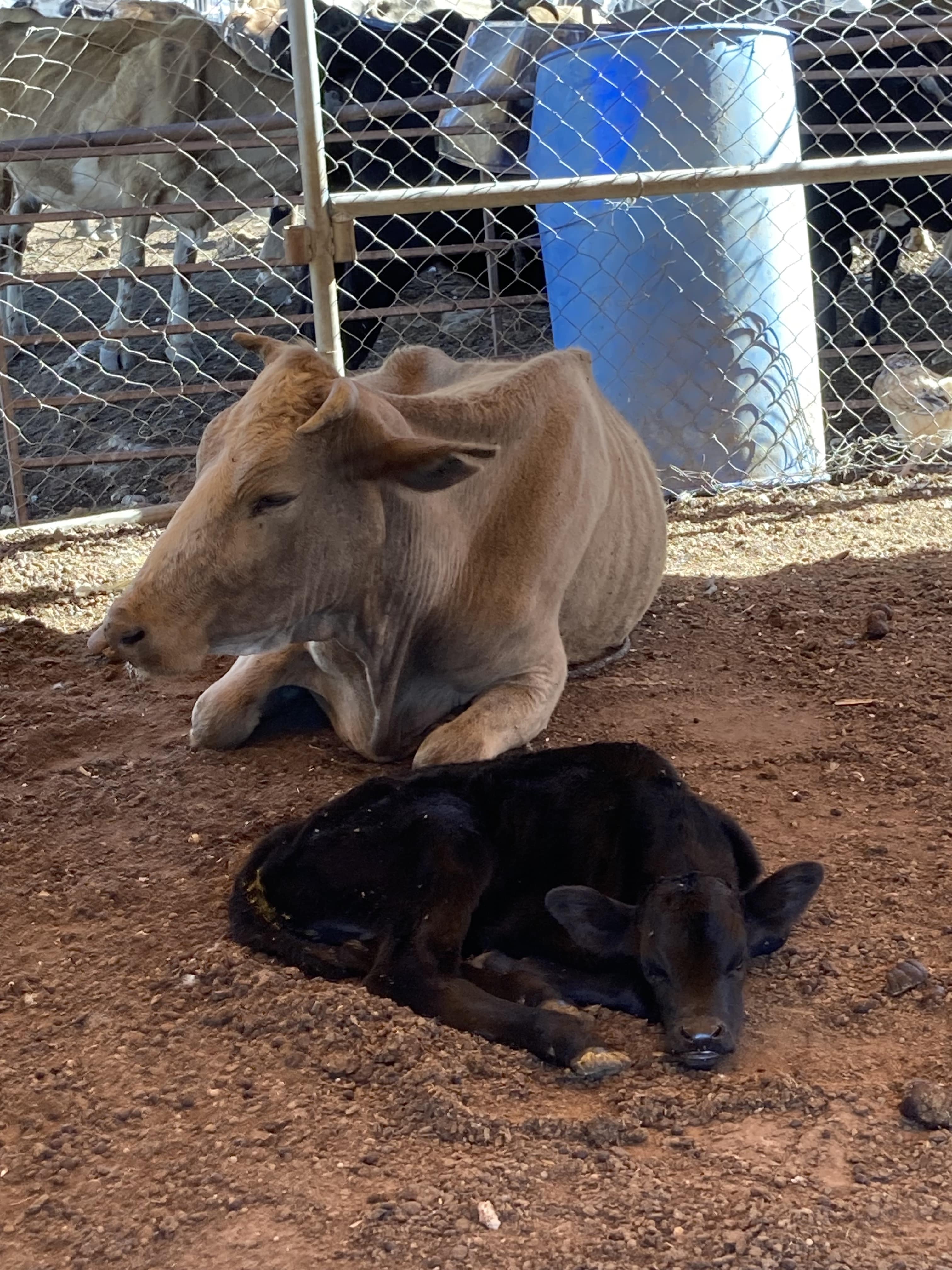
Cow with her calf in the Jordan Valley
In Bardala council leader, Ahmed, showed us how Israeli settlers broke over 2km of farmers’ water pipes overnight. They slashed them at three metre intervals so they could not be repaired. They also stole and damaged Palestinian water pumps.
Settler violence against Palestinians has sharply worsened since October 2023, as Israel continues to expand Jewish-only illegal settlements in the West Bank, further exacerbating water apartheid.
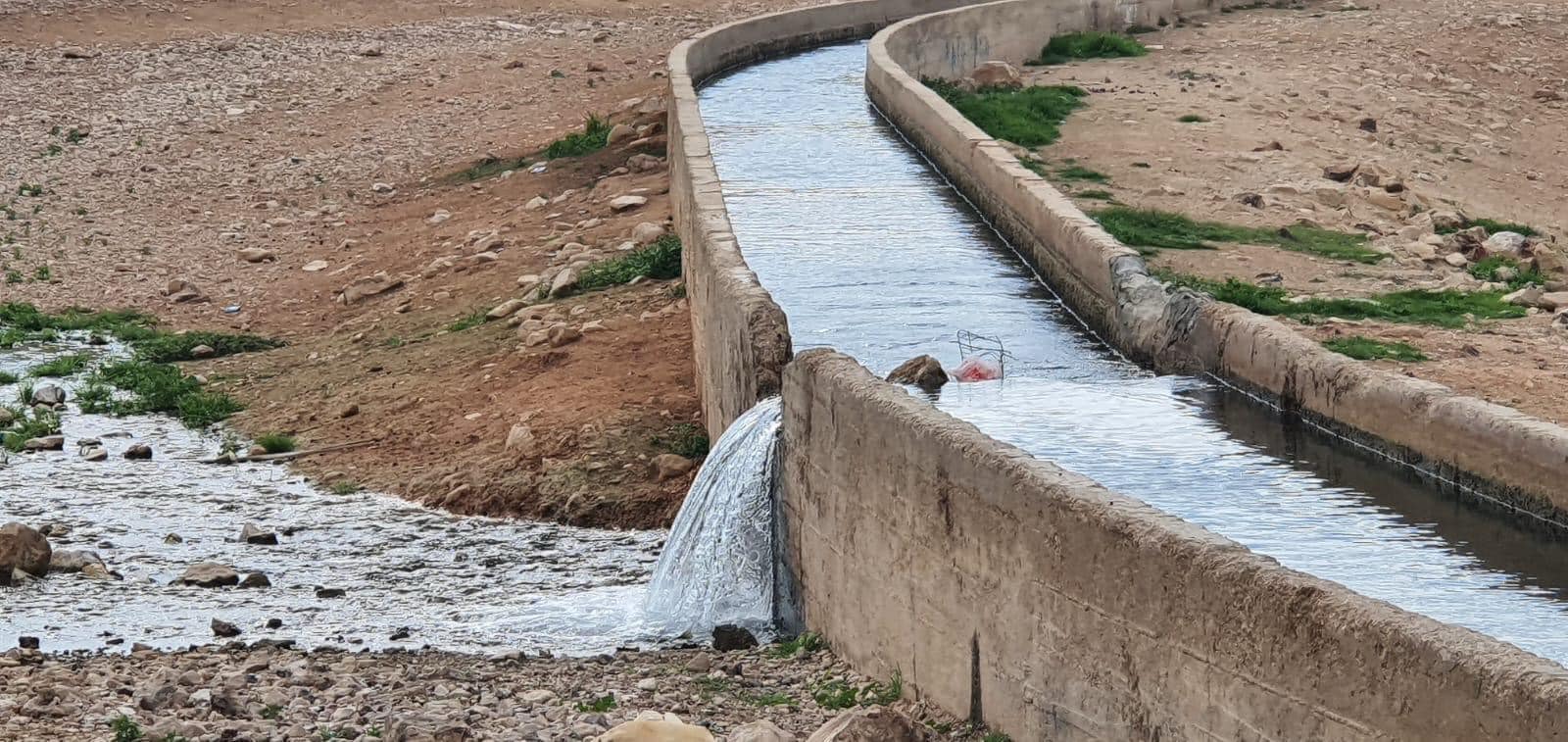
Vandalised canal with water flowing, Jordan Valley, February 2025
Water shortages also affect peoples’ health and livelihoods.
We met one lady called Fadhya, who invited us to sit on her verandah while she brushed her daughter’s hair. Her husband had died recently and she worked long hours in an Israeli date factory to support her children. Fadhya said that the expensive water she buys from the Israeli company Mekorot is not good quality. She said:
‘I have kidney problems due to lack of good drinking water.‘
The Israeli human rights organization, B’Tselem reports how Palestinians cut off from the water grid have to buy water at several times the price of the public service, yet it is often not safe to drink due to poor sanitary conditions in the tankers that transport it.
Insufficient water also affects hygiene, according to Miryam, mother of eight children. She invited us to sit on her spotless white floored veranda overlooking dusty hills with green shrubs along the nearby river. Miryam’s 16-year-old son’s legs were paralysed and he dragged himself around on the ground with his arms. Miryam could not afford his physiotherapy appointments because she was spending so much money buying water. Sometimes there was not enough water to go round and she would face hard choices. She asked:
‘Do I wash myself or clean my home?’
Water shortages are a systemic problem across Palestine. Amnesty International states:
‘Restrictions currently in place deny millions of Palestinians access to sufficient water to meet their personal and domestic needs’
Israeli organisations like StandWithUs, which support Israel’s government policy, say that:
‘Israeli settlements in the West Bank are connected to Israel’s water system, not to the Palestinian Authority’s water system.‘
Yet Palestinians have not been able to set up any water systems because their land is controlled by Israeli security forces. As Israeli human rights organisation, B’Tselem reports:
‘Israel acts as if has exclusive rights over all water sources in the territory between Jordan River and the Mediterranean Sea, and sole decision-making power over how to use them. Immediately after occupying the West Bank in 1967, Israel took over the Palestinian water sector and introduced sweeping bans and restrictions. It demanded the Palestinians obtain its approval to drill new wells, and used the new access gained to water sources, especially in the Jordan Valley, for its own ends. […] [Israel uses] the most basic of resources as a means of control and
to achieve political goals, even at the cost of keeping
millions of people thirsty.’
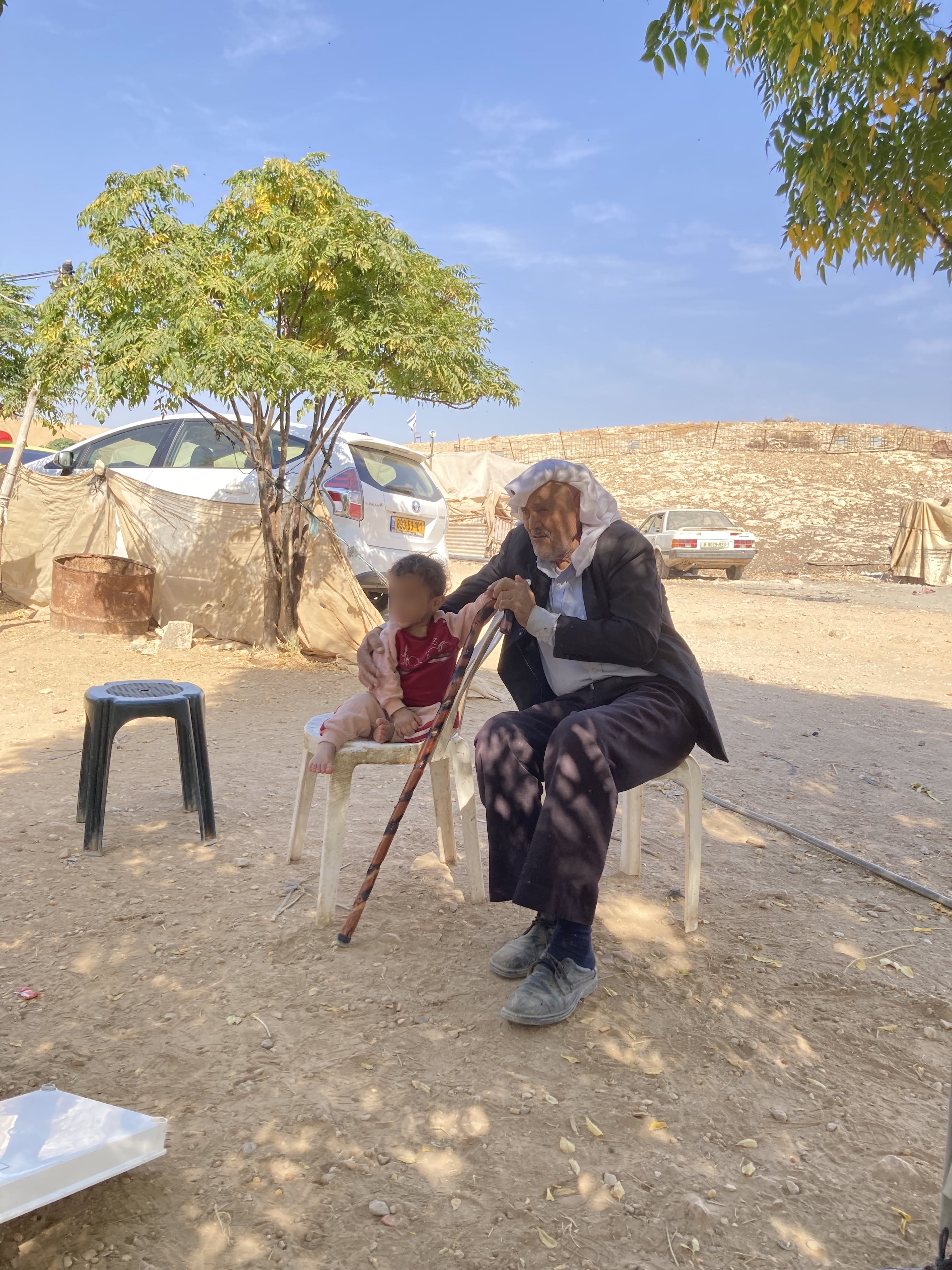
Abu Kheiri and his grandson in Al Farisiya, Jordan Valley
Grandfather Abu Kheiri played with his grandson as he smiled at us from his plastic chair by his canvas home in Al Farisiya. He said:
‘It would be paradise here if the occupation ended. We wouldn’t need help from anyone and could get on with our lives.’
Take action!
1. Write to your MP/TD: The UK and Irish governments are obliged under international law to take concrete actions to honour the ICJ ruling, and to end their complicity with the Israeli government’s illegal appropriation of Palestinian water resources and systematic impunity for settler violence. Write to your elected representative today and urge them to take measures to end Israel’s water apartheid and sanction settlers inciting and committing violence against Palestinians.
2. Sign and share our urgent action on the ICJ’s Palestine ruling. In the UK? Sign here. In Ireland? Sign here.
3. Learn more about water apartheid in the West Bank here.
What does international law say?

